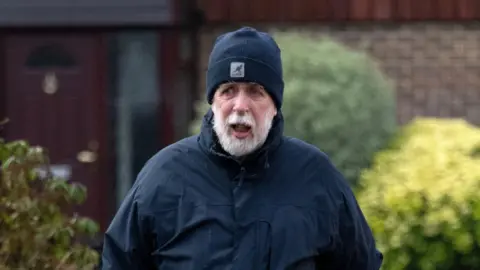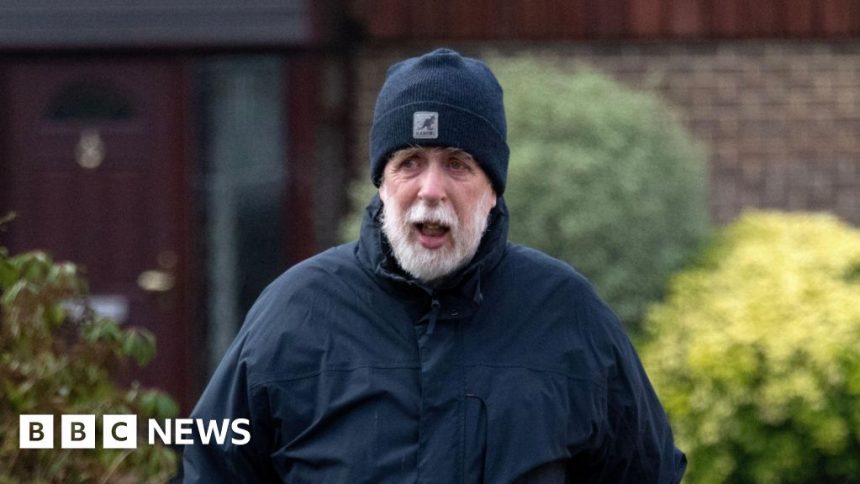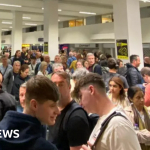Gareth Jenkins: An ‘unreliable god’ at the heart of the Post Office scandal
 Alamy
AlamyThe former Fujitsu engineer who helped design the faulty Horizon software at the centre of the Post Office scandal is set to go under the spotlight this week.
You might not have heard of Gareth Jenkins until now but he has become a key figure during the long-running Post Office Inquiry.
He will be questioned at the inquiry over his involvement in the scandal, which saw more than 900 sub-postmasters wrongly prosecuted between 1999 and 2015 after Horizon faults said money was missing from branch accounts.
Mr Jenkins will give evidence over four days – the longest run of questions any witness has faced. Here’s why what he’s got to say is so important.
The so-called ‘architect’ of Horizon
His appearance is keenly anticipated, having been postponed twice.
A top lawyer working for the Post Office once described Gareth Jenkins as an “unreliable god”, the inquiry heard.
For sub-postmasters, this so-called “architect” of Horizon has become as well-known as former Post Office CEO Paula Vennells.
“His name has featured repeatedly, often many times a day throughout these hearings,” says David Enright, solicitor with Howe & Co, which represents many of the victims.
He believes Mr Jenkins will be “subjected to the most robust questioning” at the inquiry.
He failed to disclose bugs and remote access
 PA
PAFrom 2005, Mr Jenkins was pivotal in helping the Post Office defend its faulty computer software system in criminal and civil cases.
“He was the ‘go to’ Fujitsu expert on any question of its reliability,” says David Enright.
In 2010, Mr Jenkins gave evidence in the trial of Seema Misra at Guildford Crown Court.
She told the BBC: “I was naïve at that time. I thought it was a good thing that he was working for Fujitsu because he would know the system inside out.
“If anything was going wrong in Horizon, he would have seen it.”
What Mrs Misra did not know was that shortly before the trial, Mr Jenkins had flagged a bug that affected dozens of branch accounts, and that he had suggested remotely accessing their computer terminals as one way of fixing the problem.
Mr Jenkins did not disclose this in court. Mrs Misra was found guilty of theft and false accounting and was sent to prison whilst pregnant.
If the problems had been revealed at the time, it could have stopped all the prosecutions in their tracks.
Two years later, solicitors acting for sub-postmaster Kim Wylie asked about remote access. Mr Jenkins sought guidance on what to say, warning a Post Office lawyer that including this possibility could lead to more scrutiny.
His final witness statement confirmed that this could happen, and he went on to say in his final version that altering branch accounts in this way was rare and needed to be authorised by the Post Office.
He was meant to be impartial in court
Mr Jenkins appeared as an expert witness in a number of Post Office prosecutions of sub-postmasters.
The law states that expert witnesses must be independent and unbiased. But the inquiry has heard evidence that lawyers never properly instructed Mr Jenkins about his duties.
Documents obtained by the BBC earlier this year showed that a Post Office prosecutor suggested Mr Jenkins should rephrase some of his court testimony used against Seema Misra, which strengthened his assertions over the robustness of Horizon.
IT expert Jason Coyne, who was once used as an expert witness in a Post Office case, believes Mr Jenkins was someone the Post Office could “manage”.
“We sometimes call people the ‘hired guns’. There’s a risk that’s what the Post Office was trying to do with him,” says Mr Coyne.
The BBC understands Mr Jenkins was involved in at least 15 Post Office investigations.
From ‘tainted’ witness to ‘shadow expert’
By 2012, independent forensic investigators Second Sight were brought in to examine the Horizon system.
At the time they praised Mr Jenkins’ “superb” expertise – not knowing that his evidence was being used in the courts.
However, soon after their interim report, revealing several bugs, the Post Office received legal advice warning that Mr Jenkins’ previous omissions had “fatally undermined” his credibility as an expert witness, and they should stop using him.
But Mr Jenkins remained a key figure behind the scenes.
He provided technical support and information to witnesses who testified at the 2019 Bates v Post Office trial, despite not being called to give evidence.
During the trial, lawyers representing sub-postmasters labelled him a “shadow expert” – someone who advises but does not testify in court.
The Post Office was criticised for not acknowledging that his absence might have related to its concerns over his evidence in the past criminal prosecutions.
The judge, Mr Justice Fraser, recommended that the head of the Crown Prosecution Service start an investigation into perjury against Mr Jenkins.
His expertise came at a price
As part of its contract with the Post Office, Fujitsu provided support for legal cases involving the Horizon system.
But that didn’t always cover Mr Jenkins’ work, so the Post Office had to pay extra.
The inquiry heard sometimes costs were a factor in whether the Post Office adequately investigated concerns over shortfalls in sub-postmasters’ branches.
When sub-postmaster Grant Allen experienced a shortfall of £3,000 at his branch in Cheshire, a lawyer working for the Post Office asked Mr Jenkins for an estimate for two days of data analysis.
Emails from December 2012 released by the inquiry show Mr Jenkins replied, saying “data up to 7 years is freely available. Two days of my time costs around £2k-£2.5k.”
The decision to do the data analysis was ultimately rejected.
The BBC put the contents of this story to Mr Jenkins. A lawyer representing him said it would be “inappropriate” for him to comment ahead of him giving evidence at the inquiry.
The Post Office said it gave a “heartfelt apology” to victims and “remained focused” on supporting the ongoing inquiry.
Fujitsu declined to answer the BBC’s specific questions but said it regards “this matter with the utmost seriousness”.







